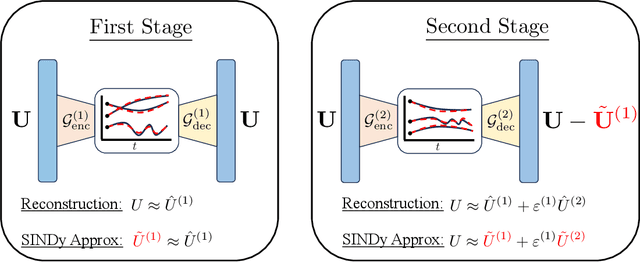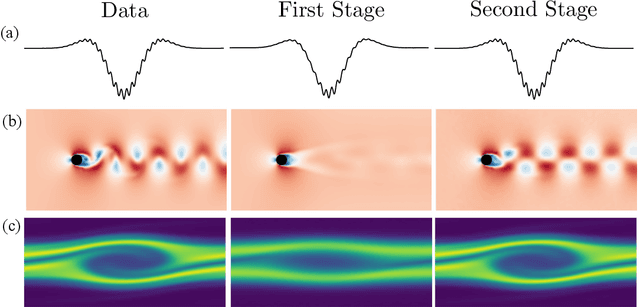Youngsoo Choi
Latent Space Element Method
Jan 05, 2026Abstract:How can we build surrogate solvers that train on small domains but scale to larger ones without intrusive access to PDE operators? Inspired by the Data-Driven Finite Element Method (DD-FEM) framework for modular data-driven solvers, we propose the Latent Space Element Method (LSEM), an element-based latent surrogate assembly approach in which a learned subdomain ("element") model can be tiled and coupled to form a larger computational domain. Each element is a LaSDI latent ODE surrogate trained from snapshots on a local patch, and neighboring elements are coupled through learned directional interaction terms in latent space, avoiding Schwarz iterations and interface residual evaluations. A smooth window-based blending reconstructs a global field from overlapping element predictions, yielding a scalable assembled latent dynamical system. Experiments on the 1D Burgers and Korteweg-de Vries equations show that LSEM maintains predictive accuracy while scaling to spatial domains larger than those seen in training. LSEM offers an interpretable and extensible route toward foundation-model surrogate solvers built from reusable local models.
Higher-Order LaSDI: Reduced Order Modeling with Multiple Time Derivatives
Dec 17, 2025Abstract:Solving complex partial differential equations is vital in the physical sciences, but often requires computationally expensive numerical methods. Reduced-order models (ROMs) address this by exploiting dimensionality reduction to create fast approximations. While modern ROMs can solve parameterized families of PDEs, their predictive power degrades over long time horizons. We address this by (1) introducing a flexible, high-order, yet inexpensive finite-difference scheme and (2) proposing a Rollout loss that trains ROMs to make accurate predictions over arbitrary time horizons. We demonstrate our approach on the 2D Burgers equation.
Reduced Order Modeling of Energetic Materials Using Physics-Aware Recurrent Convolutional Neural Networks in a Latent Space (LatentPARC)
Sep 15, 2025Abstract:Physics-aware deep learning (PADL) has gained popularity for use in complex spatiotemporal dynamics (field evolution) simulations, such as those that arise frequently in computational modeling of energetic materials (EM). Here, we show that the challenge PADL methods face while learning complex field evolution problems can be simplified and accelerated by decoupling it into two tasks: learning complex geometric features in evolving fields and modeling dynamics over these features in a lower dimensional feature space. To accomplish this, we build upon our previous work on physics-aware recurrent convolutions (PARC). PARC embeds knowledge of underlying physics into its neural network architecture for more robust and accurate prediction of evolving physical fields. PARC was shown to effectively learn complex nonlinear features such as the formation of hotspots and coupled shock fronts in various initiation scenarios of EMs, as a function of microstructures, serving effectively as a microstructure-aware burn model. In this work, we further accelerate PARC and reduce its computational cost by projecting the original dynamics onto a lower-dimensional invariant manifold, or 'latent space.' The projected latent representation encodes the complex geometry of evolving fields (e.g. temperature and pressure) in a set of data-driven features. The reduced dimension of this latent space allows us to learn the dynamics during the initiation of EM with a lighter and more efficient model. We observe a significant decrease in training and inference time while maintaining results comparable to PARC at inference. This work takes steps towards enabling rapid prediction of EM thermomechanics at larger scales and characterization of EM structure-property-performance linkages at a full application scale.
Rollout-LaSDI: Enhancing the long-term accuracy of Latent Space Dynamics
Sep 09, 2025

Abstract:Solving complex partial differential equations is vital in the physical sciences, but often requires computationally expensive numerical methods. Reduced-order models (ROMs) address this by exploiting dimensionality reduction to create fast approximations. While modern ROMs can solve parameterized families of PDEs, their predictive power degrades over long time horizons. We address this by (1) introducing a flexible, high-order, yet inexpensive finite-difference scheme and (2) proposing a Rollout loss that trains ROMs to make accurate predictions over arbitrary time horizons. We demonstrate our approach on the 2D Burgers equation.
mLaSDI: Multi-stage latent space dynamics identification
Jun 12, 2025



Abstract:Determining accurate numerical solutions of partial differential equations (PDEs) is an important task in many scientific disciplines. However, solvers can be computationally expensive, leading to the development of reduced-order models (ROMs). Recently, Latent Space Dynamics Identification (LaSDI) was proposed as a data-driven, non-intrusive ROM framework. LaSDI compresses the training data using an autoencoder and learns a system of user-chosen ordinary differential equations (ODEs), which govern the latent space dynamics. This allows for rapid predictions by interpolating and evolving the low-dimensional ODEs in the latent space. While LaSDI has produced effective ROMs for numerous problems, the autoencoder can have difficulty accurately reconstructing training data while also satisfying the imposed dynamics in the latent space, particularly in complex or high-frequency regimes. To address this, we propose multi-stage Latent Space Dynamics Identification (mLaSDI). With mLaSDI, several autoencoders are trained sequentially in stages, where each autoencoder learns to correct the error of the previous stages. We find that applying mLaSDI with small autoencoders results in lower prediction and reconstruction errors, while also reducing training time compared to LaSDI.
Thermodynamically Consistent Latent Dynamics Identification for Parametric Systems
Jun 10, 2025Abstract:We propose an efficient thermodynamics-informed latent space dynamics identification (tLaSDI) framework for the reduced-order modeling of parametric nonlinear dynamical systems. This framework integrates autoencoders for dimensionality reduction with newly developed parametric GENERIC formalism-informed neural networks (pGFINNs), which enable efficient learning of parametric latent dynamics while preserving key thermodynamic principles such as free energy conservation and entropy generation across the parameter space. To further enhance model performance, a physics-informed active learning strategy is incorporated, leveraging a greedy, residual-based error indicator to adaptively sample informative training data, outperforming uniform sampling at equivalent computational cost. Numerical experiments on the Burgers' equation and the 1D/1V Vlasov-Poisson equation demonstrate that the proposed method achieves up to 3,528x speed-up with 1-3% relative errors, and significant reduction in training (50-90%) and inference (57-61%) cost. Moreover, the learned latent space dynamics reveal the underlying thermodynamic behavior of the system, offering valuable insights into the physical-space dynamics.
Defining Foundation Models for Computational Science: A Call for Clarity and Rigor
May 28, 2025Abstract:The widespread success of foundation models in natural language processing and computer vision has inspired researchers to extend the concept to scientific machine learning and computational science. However, this position paper argues that as the term "foundation model" is an evolving concept, its application in computational science is increasingly used without a universally accepted definition, potentially creating confusion and diluting its precise scientific meaning. In this paper, we address this gap by proposing a formal definition of foundation models in computational science, grounded in the core values of generality, reusability, and scalability. We articulate a set of essential and desirable characteristics that such models must exhibit, drawing parallels with traditional foundational methods, like the finite element and finite volume methods. Furthermore, we introduce the Data-Driven Finite Element Method (DD-FEM), a framework that fuses the modular structure of classical FEM with the representational power of data-driven learning. We demonstrate how DD-FEM addresses many of the key challenges in realizing foundation models for computational science, including scalability, adaptability, and physics consistency. By bridging traditional numerical methods with modern AI paradigms, this work provides a rigorous foundation for evaluating and developing novel approaches toward future foundation models in computational science.
Physics-informed reduced order model with conditional neural fields
Dec 06, 2024

Abstract:This study presents the conditional neural fields for reduced-order modeling (CNF-ROM) framework to approximate solutions of parametrized partial differential equations (PDEs). The approach combines a parametric neural ODE (PNODE) for modeling latent dynamics over time with a decoder that reconstructs PDE solutions from the corresponding latent states. We introduce a physics-informed learning objective for CNF-ROM, which includes two key components. First, the framework uses coordinate-based neural networks to calculate and minimize PDE residuals by computing spatial derivatives via automatic differentiation and applying the chain rule for time derivatives. Second, exact initial and boundary conditions (IC/BC) are imposed using approximate distance functions (ADFs) [Sukumar and Srivastava, CMAME, 2022]. However, ADFs introduce a trade-off as their second- or higher-order derivatives become unstable at the joining points of boundaries. To address this, we introduce an auxiliary network inspired by [Gladstone et al., NeurIPS ML4PS workshop, 2022]. Our method is validated through parameter extrapolation and interpolation, temporal extrapolation, and comparisons with analytical solutions.
Data-Driven, Parameterized Reduced-order Models for Predicting Distortion in Metal 3D Printing
Dec 05, 2024Abstract:In Laser Powder Bed Fusion (LPBF), the applied laser energy produces high thermal gradients that lead to unacceptable final part distortion. Accurate distortion prediction is essential for optimizing the 3D printing process and manufacturing a part that meets geometric accuracy requirements. This study introduces data-driven parameterized reduced-order models (ROMs) to predict distortion in LPBF across various machine process settings. We propose a ROM framework that combines Proper Orthogonal Decomposition (POD) with Gaussian Process Regression (GPR) and compare its performance against a deep-learning based parameterized graph convolutional autoencoder (GCA). The POD-GPR model demonstrates high accuracy, predicting distortions within $\pm0.001mm$, and delivers a computational speed-up of approximately 1800x.
Quantifying Qualitative Insights: Leveraging LLMs to Market Predict
Nov 13, 2024



Abstract:Recent advancements in Large Language Models (LLMs) have the potential to transform financial analytics by integrating numerical and textual data. However, challenges such as insufficient context when fusing multimodal information and the difficulty in measuring the utility of qualitative outputs, which LLMs generate as text, have limited their effectiveness in tasks such as financial forecasting. This study addresses these challenges by leveraging daily reports from securities firms to create high-quality contextual information. The reports are segmented into text-based key factors and combined with numerical data, such as price information, to form context sets. By dynamically updating few-shot examples based on the query time, the sets incorporate the latest information, forming a highly relevant set closely aligned with the query point. Additionally, a crafted prompt is designed to assign scores to the key factors, converting qualitative insights into quantitative results. The derived scores undergo a scaling process, transforming them into real-world values that are used for prediction. Our experiments demonstrate that LLMs outperform time-series models in market forecasting, though challenges such as imperfect reproducibility and limited explainability remain.
 Add to Chrome
Add to Chrome Add to Firefox
Add to Firefox Add to Edge
Add to Edge